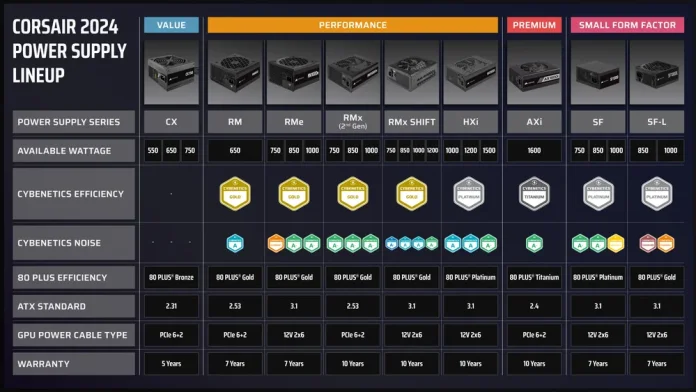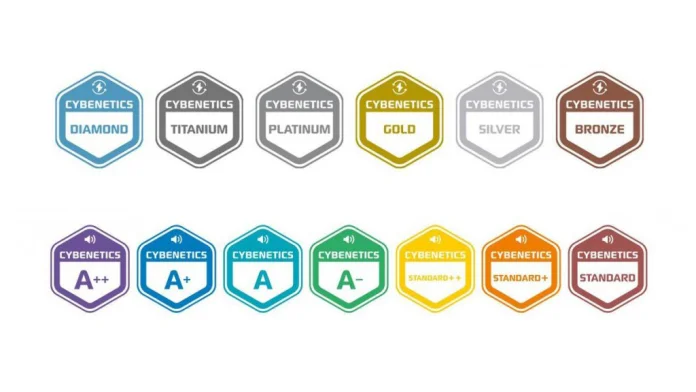Recently, we wrote about Corsair launching a new generation of power supply units (PSU) in the RMx series, where it appears in the press release that they have been certified with “Gold” for energy efficiency and “A+” for noise level, according to the Cybenetics standard.
It sounds excellent, but as one reader pointed out, there are probably many people who are unsure of what it actually means. As you know, knowledge is power, or at least the difference between buying the pig in the sack or a power supply that meets all your requirements for energy efficiency, noise level and more.
To give you a better idea of what the labels actually mean the next time you’re out shopping, we’ve put together this guide where we go through the differences between the two dominant certification standards for power supplies: 80 Plus and Cybenetics.
What is the 80 Plus certification?
The 80 Plus certification is now 20 years old and over the years has become the major reference point for assessing the energy efficiency of power supplies in North America, where 115V is used, and in Europe, where 230V is standard. The system focuses on how much of the electricity actually goes to power the computer and how much is lost as heat.
80 PLUS grades a power supply’s energy efficiency based on six levels, where “Titan” is the most energy efficient.
In the 80 Plus system, a power supply’s energy efficiency is ranked in six levels.
The certification measures how efficiently a power supply converts energy at four different loads: 10%, 20%, 50% and 100% of its capacity.
Minimum energy efficiency for 80 Plus certifications at different load levels (230V EU)
|
Standard |
Bronze |
Silver |
Gold |
Platinum |
Titan |
|
|---|---|---|---|---|---|---|
|
10% load |
90 % |
|||||
|
20% load |
82 % |
85 % |
87 % |
90 % |
92 % |
94 % |
|
50% load |
85 % |
88 % |
90 % |
92 % |
94 % |
96 % |
|
100% load |
82 % |
85 % |
87 % |
89 % |
90 % |
94 % |
Source: Wikipedia
The problem with 80 Plus
The big problem with 80 Plus is that the standard has not been updated for a long time and does not give a broader picture of PSU performance.
Corsair ranks based on both 80 Plus and Cybenetics certifications – in the future, however, it will only be the latter. Image source: Corsair
It focuses on power levels and says nothing about other factors that may matter to consumers. Therefore, now Corsair has told them to move away from 80 Plus in favor of Cybenetics to grade their power supplies.
What is the Cybenetics Certification?
The Cybenetics certification is a newer and more comprehensive standard used to assess a power supply based on several aspects. In addition to energy efficiency, Cybenetics assesses noise level according to a separate scale.
Cybenetics rates both energy efficiency (ETA) and decibel level (LAMBDA).
Like the 80 Plus, Cybenetics measures the energy efficiency at different load levels, but based on a broader evaluation of factors. While “Overall PF (power factor)” shows how well the power supply is using the power it receives without wasting it, what is called “Vampire power” measures how much power the power supply draws in standby mode.
The “Overall 5VSB Efficiency” metric refers to how efficiently the power supply converts electricity to the specific 5V standby voltage (5VSB) used when the computer is in standby mode or turned off but still connected to power.
The overall metric (“Overall Efficiency”) tells you how much of the electricity the PSU draws is converted into energy that the computer’s components can use. The higher the percentage, the better.
Cybenetics grades efficiency according to a system that goes from “Bronze” to “Diamond”, with the latter being the best.
|
Bronze |
Silver |
Gold |
Platinum |
Titan |
Diamond |
|
|---|---|---|---|---|---|---|
|
Overall efficiency |
≥84% till <87% |
≥87% till <89% |
≥89% till <92% |
≥91% till <93% |
≥93% till <95% |
≥95% |
|
Overall PF (Power Factor) |
≥0.910 |
≥0.920 |
≥0.930 |
≥0.935 |
≥0.940 |
≥0.950 |
|
Overall 5VSB efficiency |
>70% |
>72% |
>74% |
>75% |
>76% |
>78% |
|
“Vampire power” |
<0.25W |
<0.23W |
<0.20W |
<0.18W |
<0.15W |
<0.12W |
Sound levels are graded from “Standard” (loud) to A++ (basically quiet).
|
Standard |
Standard+ |
Standard++ |
A- |
A |
A+ |
A++ |
|
|---|---|---|---|---|---|---|---|
|
Sound level |
40 dB(A) till 45 dB(A) |
35 dB(A) till 40 dB(A) |
30 dB(A) till 35 dB(A) |
25 dB(A) till 30 dB(A) |
20 dB(A) till 25 dB(A) |
15 dB(A) till 20 dB(A) |
<15 dB(A) |
Source: Cybenetics and Corsair.
Is it then a bad decision to buy power supplies that lack the Cybenetics label?
Not necessarily. A power supply that lacks the Cybenetics label can still be a good choice, especially if it is 80 Plus certified. After all, it is a standard for measuring energy efficiency that has been around for a long time, and many power supplies with this certification have proven to deliver reliable performance over the years.
At the same time, the more future-oriented Cybenetics certification offers a more comprehensive assessment that also includes noise level, which is significant if you want to be sure that the power supply chews quietly and nicely.
Source: www.sweclockers.com



